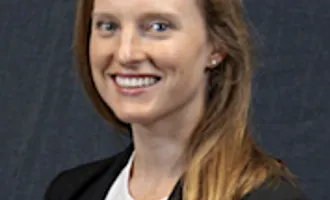Life of a Grad Student: Second Year
Student 1
Synapse: Tell us about your experience at UCSF so far.
If someone had told me how much I would have enjoyed it when I started, I don’t think I would have believed it. I’m glad, because I was reluctant to go to grad school in the first place.
People say, “Don’t go unless you’re sure.” It’s scary to hear that, because how do you know you’re ready to commit your life to one thing? I’m still not sure, but I’m really happy here.
Synapse: What about your lab experience? How did you choose your lab?
It was my last rotation. I got the same feeling that I did about UCSF — as soon as I got here, something clicked, and I haven’t regretted that. The PI was respectful, there was an array of projects, and the lab environment is collaborative.
It’s really useful to have other grad students in the lab to serve as a model of how a successful PhD should go. There are bad days, but getting to do something I really like is the greatest thing I can imagine.
Synapse: Is anything different from what you expected?
I thought it would be a lot more solitary. My undergrad PI said that it was intellectually isolating — if you go to a cocktail party, you tell people what you do, and no one knows what you’re talking about. But within the context of a university, it’s almost the opposite.
Synapse: Are there any challenges you’ve encountered? How did you deal with them?
If I have angst over anything in grad school, it’s choosing the project. It has to have a payoff but get you out in a reasonable number of years. It has to be creative, but not so creative that there’s no way to do it. It has to be interesting and able to respond to new ideas.
I eventually just had to choose and hope it works out. It’s not that I’m worried that I won’t graduate or won’t do good science. But is what I’ve chosen the best use of my time? I’m just telling myself to not worry too much.
Synapse: Is there anything else you’re still working on?
With grad school, the most stressful thing is uncertainty — both day-to-day (whether I can do an experiment) and on the meta-level (whether the PhD will work out). You have to trust that it will. There’s probably some impostor syndrome that everyone has; I just try to have a little faith in myself and in my lab.
Synapse: What advice would you give other students?
The most important thing in deciding what lab to join and what research to do is soul-searching and self-knowledge. It’s not bad spending a little time early in grad school stressing about this stuff, as long as it’s not overwhelming.
You should do some soul-searching if you’re making big life decisions. It’s unpleasant, but a lot of what it takes to succeed is momentarily unpleasant. It doesn’t mean that it won’t lead to something good.
I had no interest in this research question when I first started. I do now, but that’s grown out of a great personal fit — between myself and my PI and lab and also the kind of work I like to do. That’s probably more important to being happy in a lab than anything else.
Student 2
Synapse: Tell us about your experience at UCSF so far.
So far, it’s great. The classes are a little bit college-y, but I enjoyed the rotations —they exposed me to new things and helped me make an informed decision.
Synapse: What about your lab experience? How did you choose your lab?
I started working on the project that I hope is going to be my main project — getting a project off the ground is always an exciting phase. I chose this lab based on whether the grad students there were still happy, because that was an indicator of what my experience would be.
I wanted a lab with a lot of diversity in what people were working on, so I could be exposed to different things. There are also a lot of grad students spaced out throughout the years, so there’s a lot of perspective on what you’re doing.
Ultimately, it’s really personal, because everybody’s looking for something different. Rotations are helpful for figuring out what you want in a lab.
Synapse: Is anything different from what you expected?
The most surprising thing was how social it is. Especially in the beginning, you spend so much time with your classmates, and there’s so much chatter about who’s doing what and what different labs are like.
Synapse: Are there any challenges you’ve encountered? How did you deal with them?
Getting here, there’s definitely a period where you feel like you’re in over your head and everyone else knows stuff that you don’t know. I think everybody goes through this.
The other thing I found challenging was the decision of what lab to join. I spent a lot of time weighing pros and cons. And when it comes down to it, you know that you can’t really predict how it’s going to go.
Also, my significant other is not a scientist at all, and in the beginning it was hard for him to empathize with what I was going through. Graduate school isn’t depicted in popular culture much, so I think what made it easier for him to understand what I was doing was when he met my classmates and could get an idea of what it’s actually like.
Synapse: Is there anything else you’re still working on?
I’m starting to think about quals. Other people are telling me to ask the hardest questions about my project — what’s the worst that could happen — and I think I’ll need to lean on other people in my lab. I know I’ll get through it, but it’s just one of those uncertainties where you don’t know what’s going to happen until it happens.
Synapse: What advice would you give other students?
The one thing that I’ve done well so far is that I picked the right lab, in terms of the questions I’m asking and the people around me. I was able to do that by really asking what is important to me, what’s going to make me happy and knowing that this didn’t have to be the same as for my classmates. [For example,] I didn’t want to publish a lot of papers but be completely miserable. I just had to make that decision for myself.



